OLYMPIC SPORTS IN CHINA
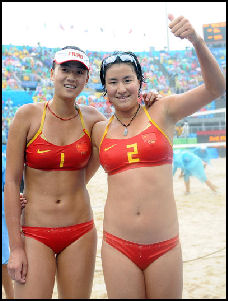
beach volleyball bronze medalists
Xue Chen and Zhang Xi The Chinese are very good at weightlifting (where women especially have set many world records and dominated competitions), diving, gymnastics, shooting, judo badminton and table tennis, They pick up medals here and there in swimming, track and field, fencing, rowing, wrestling and several other sports. These days, China is the dominant sports power in Asia. It usually wins more medals than any other country by a large margin at the Asian Games. See Olympics, Separate Section
These days the Chinese do well in a variety of Olympic sports, including some that few Chinese participate in. Chinese women often perform well in softball even though you never see women playing the sport in China. At the 2004 Summer Olympics in Athens, China even took gold medals in tae kwon do and canoeing — Luo Wei won a gold medal in the women’s 67-kilogram division in tae kwon do and Meng Guanliang and Yang Wenjun won the gold medal in the men’s doubles 500 meter canoeing event — even though few people participate in the sports in China.
See Articles Under OLYMPICS factsanddetails.com ; Chinese Olympic Committee en.olympic.cn ; China’s Olympic History china.org.cn ; Book: “Olympic Dreams: China and Sports, 1895-2008" by Xu Gouqi <
Trampoline at the 2008 Beijing Olympics
China won its first gold medal ever in trampoline and did so in dominating fashion, sweeping the two gold medals in the sport.
Lu Chunlong won the men’s competition with compatriot Dong Dong taking the bronze. Canadian Jason Burnett won the silver medal. His degree of difficulty was higher than Lu’s but Lu had better execution.
Attractive, nineteen-year-old He Wenna won the women’s trampoline event. She became one of the biggest Olympic stars in China. Dozens of website dedicated her sprang up and in one survey she was selected as one of the prettiest gold medal winners. A saying sprung up, “A man should marry a woman like He Wenna.” One sports reporter told the New York Times, “We’re sure that “Beauty He” will be a star.”
Archery at the 2008 Beijing Olympics
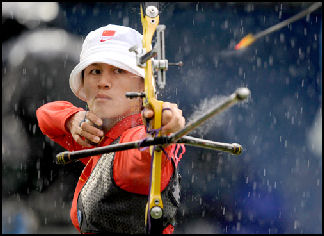
gold medalist Zhang Juan Juan China won its first gold medal ever in archery. Zhang Juan Juan won’s the women’s archery event in stunning fashion, beating one of South Korea’s best archers in the quarter finals, defeating another first rate South Korean in the semifinals and defeated defending Olympics champion Park Sung-Hyun, yes another South Korean, in the finals 110-109 to win the gold. South Koreans had won the event every year since 1984 and the three archers Zhang beat were the top three seeds.
Archery is staged as an elimination tournament with six rounds and begins with 64 competitors facing off against each other one on one. Zhang was the 27th seed in qualifying. The crowd that braved pouring rain to watch her was loud and boisterous. Afterwards Zhang said, “I think this is the result of the efforts of all the Chinese archers. I think the gold today should be attributed to the coaches and spectators, and to my confidence and composure.”
China won a silver medal in women’s team archery and a bronze medal in men’s team archery, China’s first Olympic medal in men’s archery.
Bicycling and Canoeing at the 2008 Beijing Olympics
The Chinese didn’t win any medals in cycling. Britain did rather well in the track events. The 245-kilometer road race including an 80 kilometers flat section around Beijing beginning at the Forbidden City and then seven laps on a 24-kilometer circuit between the Badaling and Juyongguan sections of the Great Wall.
Men Guanliang and Yang Wenjn won the gold medal in the men’s 500 meter, flatwater, double canoe (C-2) for the second straight Olympics. The pair led from start to finish, finishing with a time of 1 minute, 41.025 seconds. They held off a late charge by European champions Russia and lunged so hard toward the finish their boat capsized. “Our sole goal was to get the gold medal,” Yang said, “and our dream came true. I almost felt out of oxygen during the last 100m, but what was in my mind was the gold medal.”
In 2004, China won its first gold medal in canoeing only three years after devoting significant resources to the sport. Men Guanliang and Yang Wenjn were the winners that year as well.
See Weather
Boxing at the 2008 Beijing Olympics
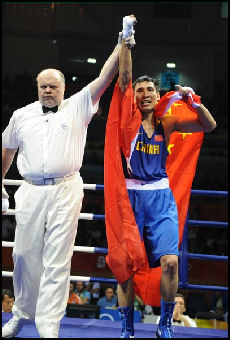
Zhang Xiaoping China won four boxing medals in Beijing, including two golds, after just managing one medal in previous Olympics. It had poured a lot money and resources into boxing. With 11 weight divisions, it was one of those sports that China decided to focus on as it provided many opportunities to win medals. The bouts were fought in the Worker’s Gym, a large, circular, half-century old building that provided a good atmosphere for boxing.
Zhang Xiaping of China won the Olympic light-heavyweight title in a controversial win over Ireland’s Kenny Egan. Zhang was the beneficiary of a controversial semifinal victory over Yerkebulam Shynaliyev. Zhang won 11-7 over Egan with the of help points scored from punches that looked as of they didn’t land cleanly.
Zhang Zhilei won the silver medal in the super heavyweight division, after getting pummeled by Italy’s Roberto Cammarelle in the gold medal match. His was the 100th medal and last medal that China won at the Olympics. Chinese Muslim Hanati Silamu, an ethnic Kazakh from Xinjiang, won a silver medal in the welterweight division.
Many felt the judges favored Chinese boxers. One Chinese boxer rallied to overcome a three point deficit in the final seconds scoring points when he seemed to be in the grasp of his opponent. Another won despite head butting his opponent three times.
Zou Shiming
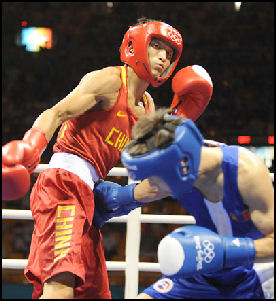
Zhou Shiming Zou Shiming won China’s first gold medal boxing, in the light-flyweight division, without hardly throwing any punches, defeating Serdamba Purvedorj of Mongolian in the final after Purvedorj retired in the second round with a shoulder injury. Zou clinched a medal with a 15-0 victory over Paddy Barnes of Ireland. After winning the gold, Zou said the final bout “made it look like I easily won the gold medal, but there was much work and preparation that went into this. It’s regrettable that I couldn’t be more entertaining to my fans in the gold medal bout, but most important is to get the gold medal, which I did.”
Zou was regarded as China’s best hope for a gold medal in boxing. A light flyweight, he won China’s first boxing medal, a bronze, in 2004 in Athens. After that he won two world championships. Don King showed up to watch one of his bouts. Some predicated he world turn out to be one of the big stars of the Olympics.
Zhou is known for his quick, accurate jabs. He wore golden boots and blew kisses to the crowd before his bouts. Only 5 foot 5 and 106 pounds, he grew up watching martial arts films and practicing wushu but somewhere along the way picked up moves that were classic Mohammed Ali. In his bout against the Barnes he played to audience, winning cheers every time he did a little shuffle while dancing around the Irishman. He was initially picked over for boxing by recruiters because his armed were deemed too short.
Equestrian Sports at the 2008 Beijing Olympics
The Chinese didn’t win any medals in equestrian sports. They didn’t try very hard to get medals in the sport simply because it is a very expensive sport and was not considered cost effective to devote resources to it.
The six equestrian events weren’t even held in Beijing; they were held in Hong Kong, where a venue was set up for dressage and show jumping and a golf course was modified for the cross country event. The day before the events began a strong storm hit Hong Kong.
Simply getting the horses to Hong Kong was a big ordeal. Nearly all of them were carried by planes, usually “combi” planes, 747 or 200 Airbus passenger planes that have extra large cargo holds. The horses are brought to the airport in trailers and transferred to light but sturdy containers that look like horse vans, Horses are social creatures and usually placed in pairs in the containers. Because there are no feed stores in Hong Kong all bedding and much of the feed had to be shipped. A total of 38 tons of feed, 48 tons of hay and 175 tons of wood shavings, a preferred horse bedding, was shipped.
The horses are usually seasoned travelers and they are rarely complications. Usually a veterinarian and horse grooms (ideally at least one groom for every four horses) accompanies the horses. At take-off and landing the horses are feed carrots and given water to make sure their ears don’t pop. In mid flight the hold is kept cool, ideally in the upper 50s or lower 60s, and the horses wear blankets, head guards and bandages or protectors around their legs.
Each horse has its own passport issued by the world governing body for equestrian sports. It doesn’t have a photo but it describes markings, coloring, scars and whorls (which are like human cowlicks) that are unique to each horse. The horses need to be quarantined. Many were quarantined in Europe for seven days before they even arrived in Hong Kong. After arriving in Hong Kong the horses were examined by a vet and then taken to stalls in a horse version of the Olympic village.
Fencing at the 2008 Beijing Olympics
Fencing is another sport that Chinese women have been doing well in lately even though few people participate in the sport in China. Luan Jujie won a gold medal in the women's foil at the 1984 Olympics. In 1992, the Chinese women's foil team won a silver medal. At the 2004 Olympics in Athens Tan Xue won a silver medal in the women’s individual sabre and Wang Lei won a silver medal in the men’s individual epee.
Zhong Man won China’s first fencing gold medal in 24 years in the men’s sabre. Zhong studied the sabre under Frenchmen Christian Bauer. He was given a $44,000 bonus from a Hong Kong bank in addition to his $51,000 government bonus and was said by the press to have “lit up Chinese hearts.”
China took the silver medal in women’s team sabre, losing to Ukraine in the finals. The Chinese jumped off to a 25-15 lead and were encouraged by loud cheers from the home town fans but eventually lost 45-44
Many Chinese expected China to win five gold medals in fencing and regarded the team’s performance as a failure. Fencers Wang Lei and Tan Xue were expected to win gold medals and were sharply ridiculed when they didn’t.
Epee fencers were different shoes on each foot, Because the right foot generally leads there is more padding on the right heel.
Judo in China
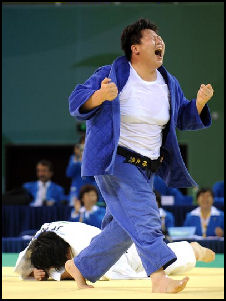
Tong Wen
At the 2004 Olympics in Athens China won five medals in judo. Again Chinese women did particularly well. Xian Dongmeu won a gold medal in the women’s 52 kilogram event; Gao Feng won a bronze medal in the women’s 48 kilogram event; and Qin Dongya won a gold medal in the women’s 70 kilogram event.
Chinese Olympic judo champion Tong Wen was banned for two years and stripped of her world title after failing a doping test at the world championship in the Netherlands in 2009. Tong, who won the gold medal in the 78 kilogram division at Beijing in 2008, tested positive for the banned substance Chenbuterol. Explaining why she tested positive her coach said, “She trains in Europe and for a while was sick of European food so we gave her a lot of pork chops.” Chenbuterol can used to treat breathing disorders and aid oxygen transportation. In China it is sometimes illegally used as an additive to pig feed.
Judo at the 2008 Beijing Olympics
Xian Dongmei won the gold medal in the under 66 kilogram division of women’s judo. Yang Xiuli won the gold medal in the 78 kilogram division. Xu Yan won a bronze medal in the 57 kilogram division.
Tong Wen won the gold medal in the over 78 kilogram division of women’s judo. She had been the dominant athlete in the 78 kilogram class. She win the gold medal in 2004 and is a three time world champion and won six straight world and Asian championships. She was the favorite in Beijing.
Rowing at the 2008 Beijing Olympics
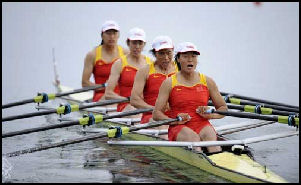
rowing gold medalists China won its first gold medal ever in rowing: in the woman’s quad sculls, finishing the 2,000 meter distance in 6 minutes 16.06 seconds. The four members of the team — Jin Ziwie, Tang Bin, Xi Aihua and Zhang Yangyang — blew kisses and raised their arms to the roars of the crowd after finishing. Zhang and Xi were so overcome with emotion they began crying.
The Chinese qualified 11 boats, more than all but four of the 60 countries entered. They also took a silver in women’s pairs.
China blew two chances for rowing medals when Chinese rower Zhang Liang failed to show up for his single sculls race and was disqualified, and consequently was also disqualified in the men’s double sculls, which Zhang was supposed to row with his teammate Su Hui. According to a coach Zhang thought he was entered in the third heat but actually he was in the second. Others were skeptical of that response because the heats were only ten minutes apart and no one had seen Zhang in the water or warming up.
Chinese rowers were expected to have a good showing in the Olympics. Before the Olympics Chinese rowers won five events at a Swiss regatta and finished third in the 2007 World Cup. An American rowing coach told the Washington Post, “Because they picked rowing as one of the sports they can have a big impact in quickly, they dumped a ton of money in it. They’re sparing no expense. They put more money into it than any other country, as far as I know, I don’t think anyone can come close.”
The Chinese hired former Soviet coach Igor Grinko in 2004 to turn the Chinese rowing program around. Known for being a taskmaster, he set the team through a grueling training regime in which team members began practice at 6:30am, ate breakfast with no drinks — not even water — practiced twice more with naps after each session and finished around 10:00pm. Sunday was the only day off.
Rower’s shoes are bolted to the boat. Rowers usually wear shoes a size too big and have their feet tied to the other rowers with a chord. If the boat capsizes a quick tug on the chord releases the feet from the shoes.
Sailing at the 2008 Beijing Olympics
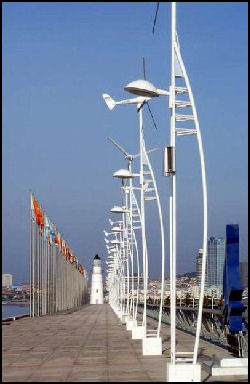
Sailing venue Qingdao was the site of the sailing competition. The 45-acre venue was created from scratch at a cost of $470 million (including accompanying infrastructure) on a former shipyard because the town had no yacht clubs or sailing centers. The winds were capricious and sometimes so calm algae began growing in the stagnant waters. Chinese fishing boats were hired to clear the algae with racks and buckets. Even so the algae sometimes got stuck in intake valves of the motor boats used by coaches and the media, causing the engine to overheat until the muck was removed by hand.
Olympic sail boats are dry-sailed, which means they are removed from the water every night and washed down so stuff doesn’t grow on them. Sailboats, rowing boats and some canoes and kayaks used in the Games were shipped using standard sea crates, which are 40 feet long, 8 feet wide and almost 9 feet wide). These can carry six or seven smaller boats and two of the largest boats — the 22-foot Ynglings.
The sailing events were marred somewhat by rain and a lack of wind. In some cases racers waited excruciatingly long periods to race in light winds that barely lifted their sails. A surprisingly number of Chinese spectators turned out for the events but most of them didn’t have a clue what was going on. With the slight winds and delays many weren’t even sure whether a race was going on or not.
China won its first gold medal ever in sailing. Yin Jian won the RS-X windsurfing competition. The silver medalist on Athens in 2004, she dominated the early races and held on to finish by the narrowest of margins, just one point ahead of silver medalist Alessandra Sensini of Italy after 11 races, including the final that counts double. All the racers used new RS-X sailboards that replaced the Mistral boards used in Athens in 2004. Xu Lijia won a bronze in the women’s Laser radial.
Tae Kwon Do at the 2008 Beijing Olympics
China took an interest in tae kwon do in 1995 when it noticed that there were few non-Koreans engaged in the sport. Five years later China won an Olympic gold medal in the sport in Sydney in 2000.
Wu Jingyu won the women’s under 49-kilogram class tae kwon do event at the Beijing Olympics in 2008. The reigning world champion, Wu defeated Buttree Puedong in the final with a stong chest kick in the first round. Guo Zhu won a bronze medal in the men’s 80 kilogram division.
Wrestling at the 2008 Beijing Olympics
Wang Jiao won the gold medal in the 72-kilogram division of women’s wrestling. She defeated Stanka Zlateva in the gold medal match.
Chang Youngxiang won the silver medal in the 74-kilogram division of men’s Greco-Roman wrestling.
Image Sources: Beijing Organizing Committee for the Games of the XXIX Olympiad Official website.
Text Sources: New York Times, Washington Post, Los Angeles Times, Times of London, National Geographic, The New Yorker, Time, Newsweek, Reuters, AP, Lonely Planet Guides, Compton’s Encyclopedia and various books and other publications.
Last updated July 2011
